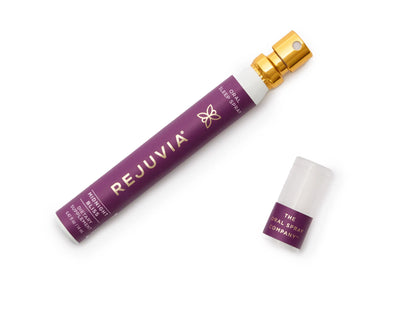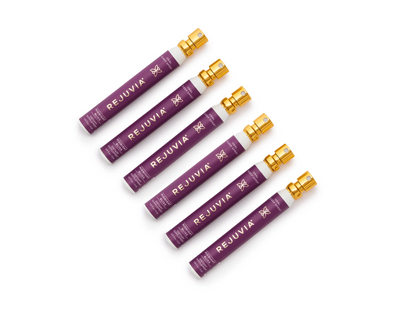Millions of people struggle with sleep, and natural remedies offer a way to improve rest without relying on prescriptions. Here are 7 natural sleep aids that can help you fall asleep faster and wake up feeling refreshed:
- Rejuvia Sleep Spray: A sublingual spray for quick absorption and fast results.
- Melatonin: Supports your body's natural sleep-wake cycle, great for jet lag or shift work.
- Valerian Root: Helps with relaxation and improves sleep quality over time.
- Magnesium: A mineral that supports long-term sleep health.
- L-Theanine: Calms the mind and reduces stress for a smoother transition to sleep.
- Glycine: Lowers body temperature and relaxes the brain for deeper sleep.
- Chamomile: A gentle herb known for its calming effects, often used as tea.
Each option targets different sleep challenges, from calming anxiety to regulating your circadian rhythm. To find the right fit, consider your specific needs, timing, and potential interactions with medications.
Quick Comparison
| Sleep Aid | How It Helps | Onset | Best For |
|---|---|---|---|
| Rejuvia Sleep Spray | Fast-acting, sublingual absorption | ~15-30 mins | Quick relief |
| Melatonin | Regulates sleep cycles | ~30-60 mins | Jet lag, shift work |
| Valerian Root | Promotes relaxation | ~30 mins to 2 hrs | Long-term sleep improvement |
| Magnesium | Supports overall sleep health | Gradual (~weeks) | Older adults, chronic insomnia |
| L-Theanine | Reduces stress and racing thoughts | ~30-60 mins | Anxiety-related sleep issues |
| Glycine | Lowers body temperature | ~30 mins | General sleep quality |
| Chamomile | Calming and soothing properties | Gradual (~weeks) | Gentle sleep aid |
Before trying any sleep aid, consult a healthcare provider, especially if you’re on medications or have health conditions. Pair these remedies with good sleep habits for the best results.
Natural Sleep Aids - Which Remedy is Most Effective?
How Natural Sleep Aids Work
Natural sleep aids function through various mechanisms that help your body ease into restful sleep. Understanding these processes can make it easier to choose the right solution for your sleep troubles. Each method targets specific obstacles to restful sleep, helping you identify the best remedy for your needs.
Neurotransmitter Modulation is a primary way natural sleep aids improve rest. Many of these aids enhance the activity of GABA, a neurotransmitter that calms the brain and promotes relaxation. Others influence serotonin levels, which your body converts into melatonin - the hormone responsible for signaling that it’s time to sleep.
Circadian Rhythm Regulation is another important factor. Your circadian rhythm, or internal clock, determines when you feel awake or drowsy throughout the day. Natural sleep aids can help reset this rhythm if it’s thrown off by stress, travel, or irregular routines. Some supplements directly increase melatonin levels, while others support the body’s natural processes for maintaining a healthy sleep-wake cycle. Together, these actions help restore a more natural and consistent sleep pattern.
Physical and Mental Relaxation is also critical. Many natural sleep aids work by lowering cortisol levels - the stress hormone that can keep you awake. Others address physical tension or racing thoughts, both of which can interfere with restful sleep. By tackling these physical and mental barriers, these aids create a more peaceful environment for sleep.
The timing and absorption of sleep aids play a big role in their effectiveness. For example, sublingual sprays and liquid formulations bypass the digestive system, taking effect in just 15–30 minutes. Capsules, on the other hand, may take 30–60 minutes to work. Knowing how quickly a product acts can help you select the right option for your routine.
Product quality is another crucial factor. Always look for third-party tested products to ensure purity and consistent potency. Lower-quality options may contain inconsistent levels of active ingredients, which could negatively affect their ability to support restful sleep.
Proper dosing is key for safety and effectiveness. Starting with the lowest recommended dose can help you avoid side effects like next-day grogginess or diminishing returns. The optimal dose varies from person to person, depending on factors like body weight, metabolism, and sensitivity.
If you’re considering natural sleep aids, consult a healthcare provider - especially if you’re taking medications or have underlying health conditions. While combining certain sleep aids may enhance their effectiveness, professional guidance is essential to ensure safety.
1. Rejuvia Sleep Spray

Rejuvia Sleep Spray is a quick-acting sublingual spray designed to deliver sleep-supporting ingredients directly into your bloodstream. Unlike traditional capsules, this spray skips the digestive process, allowing for faster absorption and quicker results.
The spray comes with a refreshing mint flavor, provides 30 servings per bottle, and is vegan, non-GMO, and triple lab tested. Its flexible dosing system lets you tailor the amount to fit your needs, whether you're dealing with occasional sleeplessness or need regular support. Plus, its non-habit-forming formula means you can use it without the strict dosing schedules associated with pills or capsules. Here's a breakdown of how it works, how to use it, and what to watch out for.
Onset of Action
Thanks to its sublingual delivery, the spray is absorbed quickly, making it a great option when you need fast-acting sleep assistance.
Common Dosing Range
Begin with 2–3 sprays under your tongue about 30 minutes before bedtime. Hold the spray under your tongue for 10–15 seconds before swallowing. Depending on your response, you can adjust the dose between 1 and 4 sprays. Each bottle provides around 30 doses when using 3 sprays per serving.
Potential Side Effects
When used as directed, Rejuvia Sleep Spray is generally well tolerated. However, using too much or spraying it too close to wake time could lead to mild morning grogginess. To reduce the chance of lingering drowsiness, start with the lowest effective dose and adjust as needed for a restful night without compromising your morning energy.
2. Melatonin
Melatonin is one of the most trusted natural sleep aids, backed by science and widely used for its simplicity and effectiveness. This hormone is naturally produced by the pineal gland in your brain when it gets dark, signaling to your body that it’s time to wind down. As a supplement, melatonin has gained popularity for helping people regulate their sleep patterns without the need for prescription medication.
What makes melatonin different from traditional sleep aids is that it doesn’t force drowsiness. Instead, it works by helping your body maintain its natural sleep-wake cycle. This makes it particularly useful for those dealing with jet lag, irregular work shifts, or disrupted internal clocks.
How Quickly It Works
Melatonin typically starts working within 30 to 60 minutes. Immediate-release forms help you fall asleep faster, while extended-release versions are designed to keep you asleep longer. To maximize its benefits, take melatonin 1 to 2 hours before bedtime. Timing is key - taking it too early can shift your sleep schedule, while taking it too late might leave you feeling groggy the next day. These effects have been consistently supported by clinical studies.
What Research Says
Studies show that melatonin can shorten the time it takes to fall asleep by 7 to 12 minutes and improve overall sleep quality. It’s especially effective for conditions like jet lag and delayed sleep phase disorder, where resetting your circadian rhythm is crucial. Research consistently highlights its ability to improve sleep when used correctly and at the right dosage.
How Much Should You Take?
Getting the dosage right is crucial for melatonin to work effectively. For most adults, 0.5 to 3 mg taken 1 to 2 hours before bedtime is sufficient. If you’re using it for jet lag, doses of 0.5 to 5 mg at your destination’s bedtime are common. Children and older adults generally require smaller amounts, around 0.5 to 1 mg. It’s always best to start with the lowest effective dose, as higher doses can sometimes disrupt sleep or lead to grogginess the next day.
Are There Side Effects?
Melatonin is generally safe and well-tolerated, but some people might experience mild side effects like headaches, dizziness, nausea, or daytime drowsiness. These symptoms are usually temporary and tend to fade as your body adjusts.
However, melatonin can interact with certain medications, such as blood thinners, diabetes drugs, and immunosuppressants. It may also affect blood sugar and blood pressure in some individuals. If you’re on medication or have underlying health conditions, it’s a good idea to check with your healthcare provider before adding melatonin to your routine.
3. Valerian Root
Valerian root, a plant native to Europe and Asia, contains compounds like valerenic acid and isovaleric acid, which interact with GABA receptors in the brain to encourage relaxation. Unlike synthetic sleep aids, valerian root supports your body’s natural process of winding down for sleep, without causing harsh side effects.
Curious about how quickly valerian root takes effect? Let’s break it down.
How Quickly It Works
Valerian root typically starts working within 1 to 2 hours. For best results, take it 30 minutes to 2 hours before bedtime to allow for proper absorption. While some people might feel relaxed right away, the full benefits often emerge after using it consistently for several weeks.
If you’re looking for faster results, liquid extracts tend to act more quickly than capsules. On the other hand, valerian root tea can double as a soothing bedtime ritual, helping you relax even before the effects kick in.
Scientific Evidence Strength
Research on valerian root shows encouraging yet mixed results. Clinical studies have highlighted improvements in sleep quality and slight reductions in the time it takes to fall asleep. The most consistent findings suggest valerian enhances overall sleep quality rather than significantly speeding up sleep onset. While study quality varies, the general consensus leans toward valerian being a helpful, natural aid for better sleep.
Common Dosing Range
The appropriate dosage of valerian root depends on the form you’re using:
- Standardized extracts: 300–600 mg, taken 30 minutes to 2 hours before bed.
- Tea: Steep 2–3 grams of dried root in hot water for 10–15 minutes.
- Liquid tinctures: 1 to 1.5 teaspoons.
- Capsules with powdered root: 400–900 mg.
If you’re new to valerian root, it’s wise to start with the lower end of the dosing range and adjust as needed.
Now, let’s address the potential side effects you should keep in mind.
Potential Side Effects
Valerian root is generally well-tolerated, but some people may experience mild side effects like headaches, dizziness, stomach discomfort, or morning grogginess. Interestingly, a small number of users report feeling unusually alert or restless after taking valerian, which might be due to individual differences in how the body processes it. Vivid dreams are another possibility, especially when starting the supplement or using higher doses.
It’s also important to know that valerian can interact with other sedatives, such as prescription sleep aids, anti-anxiety medications, or even alcohol, potentially intensifying their effects. If you’re taking medications that influence the central nervous system, consult a healthcare provider before adding valerian root to your routine.
For most people, long-term use of valerian root appears safe, but some experts suggest taking occasional breaks to avoid your body becoming too accustomed to its effects.
4. Magnesium
Magnesium, a vital mineral for overall health, takes a more gradual approach to improving sleep quality compared to faster-acting options like melatonin or Rejuvia Sleep Spray. Instead of delivering immediate results, it works over time to support better sleep.
How Quickly It Works
There isn’t much data on how quickly magnesium can enhance sleep. However, one clinical trial showed that taking 500 mg of elemental magnesium daily for 8 weeks helped older adults sleep longer and fall asleep faster. This indicates that magnesium works more like a long-term solution rather than a quick fix, making it a slower alternative to fast-acting sleep aids.
Scientific Evidence Strength
Research on magnesium’s impact on sleep is still somewhat limited. A 2021 review found that magnesium might reduce the time it takes to fall asleep for older adults with insomnia, but the studies reviewed were of low quality. Overall, there isn’t enough strong evidence to make definitive claims about its effectiveness for treating insomnia.
sbb-itb-de8e20a
5. L-Theanine
L-theanine, an amino acid found naturally in tea leaves, is known for promoting relaxation and improving sleep without leaving you feeling groggy the next morning. By helping to calm the mind and reduce stress, it encourages a more natural transition into sleep.
Onset of Action (How Quickly It Works)
L-theanine is quickly absorbed into the bloodstream, crossing the blood-brain barrier within 30–40 minutes and reaching peak levels around an hour after ingestion. To make the most of its calming effects, it's best to take L-theanine 30 to 60 minutes before bedtime.
Unlike stronger sleep aids that can knock you out fast, L-theanine works gently by quieting an overactive mind. Instead of sudden drowsiness, you may feel a gradual sense of calm that helps you drift off more naturally.
Scientific Evidence Strength
Research into L-theanine’s sleep benefits has been promising. A review published in 2025 highlighted its ability to reduce the time it takes to fall asleep while also improving sleep duration, efficiency, and quality. Other studies have noted that it can help minimize nighttime wakefulness.
That said, much of the research involves combining L-theanine with other ingredients or has been conducted on animals, so more human-focused studies are needed. Scientists believe its calming impact on the central nervous system plays a key role in its sleep-promoting properties.
Common Dosing Range
The typical dose for L-theanine is around 200 mg per day, often taken for four weeks. The FDA considers it safe in amounts up to 250 mg daily.
Studies have explored doses ranging from 100 mg to 400 mg, with most research focusing on the 200–400 mg range taken daily for 4–8 weeks. In some cases, doses as high as 900 mg per day have been used safely for up to 8 weeks, though such high amounts are not usually necessary.
Starting with the lowest recommended dose and gradually increasing it can help you find the right balance while minimizing potential risks.
Potential Side Effects
One of L-theanine’s greatest benefits is its mild side effect profile. It’s well-tolerated and doesn’t typically cause daytime drowsiness.
However, some people may experience minor issues like headaches, migraines, or stomach upset. At higher doses, such as 450–900 mg per day, side effects like drowsiness, fatigue, irritability, trouble concentrating, and even sleep disturbances have been reported.
If you’re getting L-theanine from green tea instead of supplements, keep in mind that the caffeine in tea can sometimes cause nausea, stomach upset, or irritability. Pregnant or breastfeeding women should consult a healthcare provider before using L-theanine supplements due to limited safety data. Additionally, people with low blood pressure should check with their doctor, as L-theanine may lower blood pressure further.
6. Glycine
Glycine is a naturally occurring amino acid that supports better sleep by cooling your core body temperature and calming brain activity. This combination helps you fall asleep faster and enjoy deeper, more restful sleep.
Onset of Action (How Quickly It Works)
Glycine starts working fairly quickly compared to many other natural sleep aids. To get the best results, take it about 30 minutes before bedtime. This timing allows the amino acid to be absorbed and begin its soothing effects on your nervous system as you prepare for sleep. Unlike remedies that might make you feel instantly drowsy, glycine encourages a gentle sense of relaxation, helping your body ease into rest naturally. Studies back up this quick onset of benefits.
Scientific Evidence Strength
Research highlights glycine’s ability to improve sleep by helping people fall asleep faster and enhancing overall sleep quality. For example, studies show that adults taking 3 grams of glycine daily over a period of up to 24 weeks experienced notable improvements. Glycine acts as an inhibitory neurotransmitter in the brain, reducing overactive thoughts and promoting calmness.
Common Dosing Range
The most effective dose for sleep typically falls between 3 and 5 grams taken orally before bed. Research often points to 3 grams as an ideal starting point for sleep benefits. If needed, you can gradually increase the dose. Some studies have explored higher doses, with up to 6 grams daily over 4 weeks being considered safe for most people. Following these dosing guidelines can help maximize sleep benefits while reducing the risk of side effects.
Potential Side Effects
Glycine is generally safe for healthy adults, but mild side effects can occur. These include nausea, vomiting, mild stomach upset, and, occasionally, diarrhea or soft stools. Some users also report drowsiness or headaches. While drowsiness can be helpful for sleep, it could be an issue if you need to stay alert.
Certain groups should avoid glycine. Pregnant or breastfeeding women are advised against using it due to limited safety data. Additionally, people taking clozapine (Clozaril) should steer clear of glycine, as it may interfere with the medication's effectiveness. If you have kidney or liver conditions, consult a healthcare provider before taking glycine, as these organs play a role in its metabolism.
Allergic reactions are rare but possible. Symptoms like rash, itching, swelling, severe dizziness, or trouble breathing require immediate discontinuation and medical attention. Always check with your healthcare provider before introducing glycine, especially if you have pre-existing conditions or take other medications.
7. Chamomile
Chamomile, derived from Matricaria chamomilla flowers, stands out as a gentle yet effective remedy for promoting better sleep. Known for its calming properties, it has long been used as a natural sleep aid.
Onset of Action
A pilot study revealed that chamomile could help people fall asleep faster, reducing sleep onset time by 16 minutes. It also decreased nighttime awakenings by 0.8, compared to a smaller reduction of 0.3 with a placebo. While some benefits are noticeable early on, consistent use over 2 to 4 weeks tends to yield more noticeable improvements in overall sleep quality.
Scientific Evidence Strength
Research supports chamomile's role in enhancing sleep, but the evidence comes with some limitations. A systematic review and meta-analysis of ten studies involving 772 participants found that chamomile significantly improved sleep quality. The studies reported a reduction in Pittsburgh Sleep Quality Index (PSQI) scores, with a weighted mean difference of –1.88 points (95% CI: –3.46, –0.31). However, many of these studies had a high risk of bias, and only one evaluated the purity and potency of the chamomile products used. While chamomile has been shown to reduce the time it takes to fall asleep and minimize nighttime awakenings, it doesn’t consistently improve total sleep duration or sleep efficiency. These findings offer practical insights for using chamomile to support better sleep.
Common Dosing Range
Chamomile is most commonly enjoyed as a tea. To prepare, steep dried chamomile flowers in hot water and drink it before bed. It’s also available in extract forms for those who prefer an alternative. Starting with a small dose is recommended, allowing adjustments based on individual needs.
Natural Sleep Aids: How They Compare
When deciding on a natural sleep aid, it’s important to understand how each option differs in terms of speed, effectiveness, safety, and dosing.
Speed and effectiveness can vary widely. For example, Rejuvia Sleep Spray works quickly due to its sublingual delivery system, which allows for fast absorption. Melatonin, backed by extensive research, is known to reduce the time it takes to fall asleep and extend overall sleep duration, making it particularly helpful for jet lag or adjusting to shift work schedules. On the other hand, options like L-theanine and glycine offer noticeable relaxation benefits, while valerian root, magnesium, and chamomile often require consistent use to achieve their full effects.
Magnesium has been shown to enhance sleep efficiency, increase total sleep time, and lower cortisol levels, which can help reduce the time it takes to fall asleep. Research on L-theanine highlights its ability to reduce stress and anxiety, which can lead to better sleep quality and fewer nighttime awakenings. The table below provides a clear comparison of various sleep aids.
| Sleep Aid | Benefits | Main Side Effects | Best For |
|---|---|---|---|
| Rejuvia Sleep Spray | Rapid absorption, adjustable dosing | Minimal reported | Quick relief |
| Melatonin | Reduces sleep latency, increases sleep time | Headaches, dizziness, nausea | Jet lag and shift work |
| Valerian Root | Improves sleep quality, helps with falling asleep | Morning drowsiness, upset stomach | Long-term sleep improvement |
| Magnesium | Enhances sleep efficiency, lowers cortisol | Diarrhea, nausea | Older adults with insomnia |
| L-Theanine | Reduces stress, improves sleep quality | Mild headache, dizziness | Anxiety-related sleep issues |
| Glycine | Supports circadian rhythms, reduces daytime sleepiness | Minimal side effects | General sleep quality |
| Chamomile | Gentle calming and sleep-promoting effects | Mild gastrointestinal issues, possible allergies | Gentle sleep aid |
Safety and Drug Interactions
Safety is a critical consideration. Glycine, even at high doses (up to 30 grams daily), is generally well-tolerated. Similarly, L-theanine is known for its excellent tolerability and doesn’t cause daytime drowsiness. However, melatonin is not suitable for individuals with certain conditions, such as depression, seizure disorders, or those who have had organ transplants. Valerian root, while effective for some, has been linked to rare instances of liver damage and should not be used alongside alcohol or sedative medications.
Drug interactions are another factor to keep in mind. Melatonin can interact with blood thinners, sedatives, and certain medications, potentially reducing their effectiveness. Magnesium should be used cautiously by individuals with kidney disease due to possible interactions with medications. Additionally, chamomile may interact with drugs metabolized by cytochrome P450 enzymes, and people allergic to plants in the Asteraceae family should be cautious.
Dosing Options
Dosing flexibility is another area where these options differ. Rejuvia Sleep Spray offers a customizable approach, allowing users to adjust their dosage based on nightly needs. On the other hand, supplements like melatonin and magnesium typically come in fixed-dose formats, although some adjustments can be made.
For those seeking immediate relief, Rejuvia Sleep Spray and melatonin are solid options. If stress or anxiety is the main culprit behind poor sleep, L-theanine might be a better fit. Meanwhile, older adults experiencing age-related changes in sleep patterns may benefit from magnesium. For those with sensitive systems, gentler choices like chamomile could be worth considering.
How to Use Natural Sleep Aids Safely
Using natural sleep aids effectively isn't just about choosing the right product - it’s about using them responsibly. While these remedies are often gentler than prescription medications, they still require thoughtful consideration and proper use.
Talk to your healthcare provider first if you’re taking medications, managing chronic conditions, or are pregnant or breastfeeding. Ingredients like melatonin or valerian root can interact with certain drugs, so it’s better to err on the side of caution.
Start with the lowest effective dose - for instance, 0.5–1 mg of melatonin or 200 mg of magnesium - and adjust gradually if needed. This helps reduce the chance of unwanted side effects while allowing you to find the dose that works best for you.
Pay attention to how your body responds. Track how quickly you fall asleep, the quality of your rest, and any side effects. If you notice persistent issues, stop using the product and consult your healthcare provider.
Choose products from trustworthy brands that carry third-party certifications like NSF International or USP. These certifications help ensure the product’s purity and strength.
Time your doses carefully. For example, take melatonin 30–60 minutes before bed to allow it to work effectively, and avoid taking it too late at night. Products like Rejuvia Sleep Spray, which use sublingual delivery, offer faster absorption and more flexibility with timing.
Stick to a consistent sleep routine while using natural aids. These supplements work best when paired with good sleep hygiene practices, such as maintaining regular bedtimes, creating a relaxing sleep environment, and limiting screen time before bed. Remember, these aids are most effective as part of a broader approach to better sleep - not as a standalone fix.
Avoid combining multiple sleep aids unless you’ve consulted a healthcare provider. Mixing supplements can lead to unexpected side effects or interactions.
For travel or shift work, take melatonin at your destination’s bedtime or about 30 minutes before your intended sleep time to help your body adjust.
Store your sleep aids properly in a cool, dry place away from sunlight, and check expiration dates regularly. Proper storage helps maintain their effectiveness over time.
If sleep problems persist beyond 4–6 weeks, it’s time to seek professional advice. Ongoing sleep issues may point to underlying conditions that require a different treatment plan beyond natural supplements.
Conclusion
Finding the right natural sleep aid can make a big difference in improving your sleep quality, but the key lies in choosing what suits your specific needs and using it responsibly. Whether it’s the quick convenience of Rejuvia Sleep Spray, the rhythm-balancing effects of melatonin, or the soothing properties of chamomile, each option brings its own advantages to help you drift off more easily.
That said, it’s important to remember that "natural" doesn’t always mean "safe for everyone." As Dr. Dustin Cotliar, MD, MPH, points out: "We often want a quick fix to our sleep troubles, but taking a look at your sleep hygiene first and making small changes to improve your sleep routine is usually best."
"It's important to be a savvy consumer and ensure that any product you're considering taking is of high quality and certified by a third party." – Dustin Cotliar, MD, MPH
Before starting any sleep aid, always check with your healthcare provider, especially if you’re on other medications or managing health conditions. Since natural sleep aids aren’t as tightly regulated by the FDA as traditional medications, professional advice is crucial. Stick to the recommended dosages, look for products with trusted third-party certifications (like the U.S. Pharmacopeia label), and store them safely out of reach of children.
For the best results, pair these remedies with healthy sleep habits. A consistent bedtime, a relaxing sleep environment, and good sleep hygiene are essential companions to any natural aid. And if your sleep struggles persist despite these efforts, don’t hesitate to seek professional help. Sleep is too important to overlook - combining natural solutions with expert guidance can help you achieve the restful nights you deserve.
FAQs
How can I find the best natural sleep aid for my sleep challenges?
When picking a natural sleep aid, the first step is figuring out what’s causing your sleep troubles. Are you struggling to fall asleep, waking up too often during the night, or rising too early? Different remedies target different problems. For instance, melatonin is great for adjusting your sleep-wake cycle, while herbal options like valerian root or passionflower can help calm general insomnia or restlessness.
Before trying anything, it’s smart to check with a healthcare professional to make sure it’s safe and fits your health needs. Pay close attention to the recommended dosage and timing to get the best results and avoid unwanted side effects. By personalizing your approach, you can discover the option that works for you.
Can natural sleep aids interact with medications?
Yes, natural sleep aids can interact with certain medications, so it’s important to approach them with caution. For instance, melatonin might enhance the effects of sedatives, blood pressure medications, or immunosuppressants, which could change how these drugs work. Pairing melatonin with other herbal remedies known for their sedative effects can also increase drowsiness and heighten the risk of side effects.
Another factor to consider is alcohol. Mixing natural sleep aids with alcohol may amplify sedative effects, potentially causing dizziness, confusion, or even slowed breathing. To stay safe and avoid any unwanted interactions, it’s a good idea to check in with your healthcare provider before using natural sleep aids alongside any medications you’re currently taking.
How can I use natural sleep aids effectively to improve my nightly routine?
To make the most of natural sleep aids, start by setting a consistent sleep routine. Aim to go to bed and wake up at the same time every day - even on weekends. This helps regulate your internal clock. Next, create a calming bedtime atmosphere: dim the lights, keep your bedroom cool (around 65°F is ideal), and steer clear of screens for at least an hour before you hit the pillow.
Adding relaxing activities to your evening can also help signal to your body that it’s time to wind down. Consider a warm bath, some deep breathing exercises, or grounding techniques like the 5-4-3-2-1 method. About an hour before bed, you might also try natural sleep aids like valerian root tea or a small dose of melatonin to ease into restfulness. These simple adjustments can go a long way in improving your sleep quality.





